As part of a series looking at some of Southport’s cross-over sporting stars, today’s focus is on a man who has a remarkable life story.
Southport has had no shortage of gifted all-rounders, but few have led lives as eventful as Vernon Bridge Delany. A familiar face in both cricket whites and football boots before the First World War, he would go on to serve with distinction and survive a brutal chapter in European history.
Alongside his sporting pursuits, Delany worked in the family’s cotton export business, William Delany and Co, as an “assistant packer.” The family lived on Hesketh Road in Southport.
Born in Manchester in December 1892, Delany was educated at the Sandringham School in Southport before graduating from Manchester University. His father, David T. Delany, captained Southport & Birkdale Cricket Club, and Vernon followed in his footsteps.
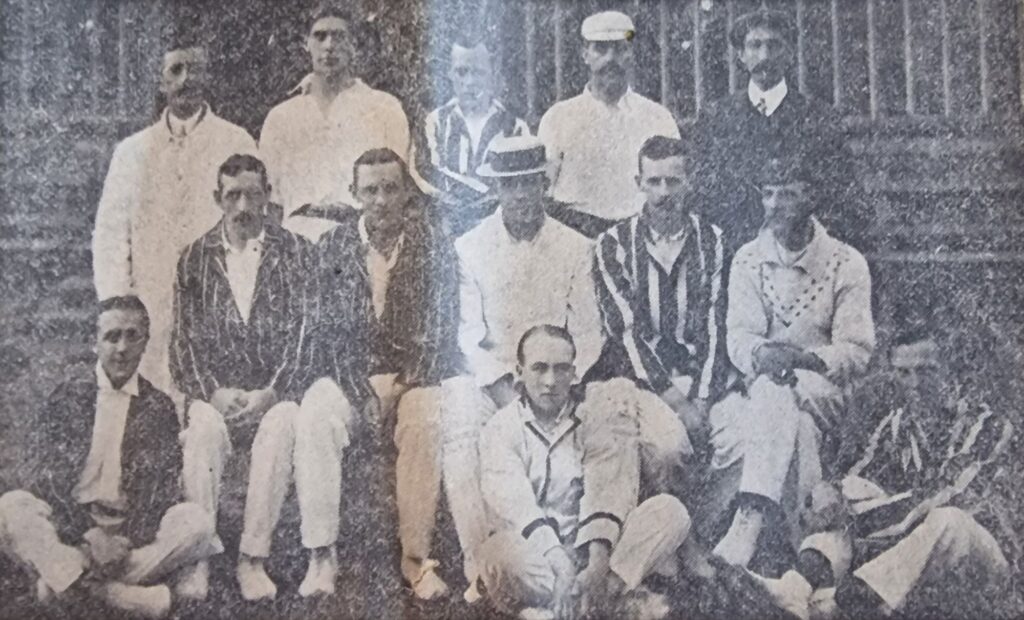
Vernon became not only an excellent cricketer like his father, but also a talented footballer. He made his debut for Southport Central on 17 February 1912 against Blackpool in the Central League, earning heritage number 320, and went on to make 25 appearances over the following two seasons. His last came on 25 April 1914 against Barnsley. Central were already a professional club competing in one of the strongest regional leagues in the country, and Delany’s performances were praised for his pace and attacking instinct during a highly competitive period in the club’s history.
His last appearance for Southport & Birkdale Cricket Club was on 22nd August 1914 at Oxton, where S&B were beaten 117 to 130 for 7. Delany finished top scorer with 27. With the outbreak of war on 4th August, all further fixtures were cancelled as players went off to enlist in the services. It was the last match to be played for almost five years until the conclusion of hostilities with the club closing down for the duration of the war in common with all the other clubs in the district.
Delany was initially unable to enlist, but he joined the 20th (Service) Battalion of the Lancashire Fusiliers (4th Salford Pals)in Salford on 23rd March 1915. Known as a “Bantam Battalion” for its recruitment of men under 5ft 3in, the unit trained in Conwy and Cholderton before landing at Le Havre in January 1916.
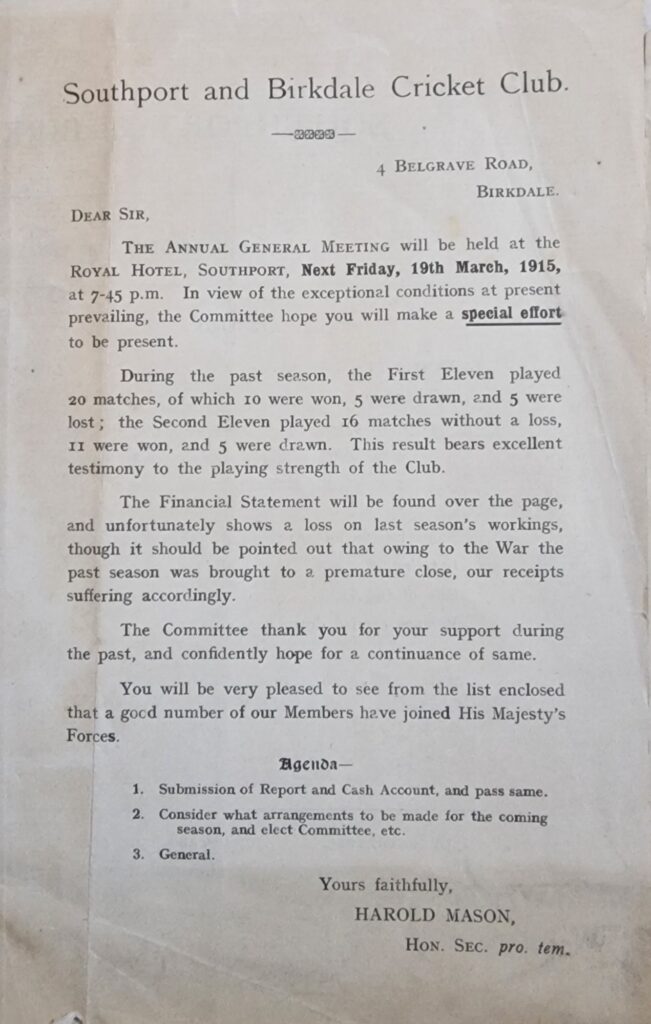
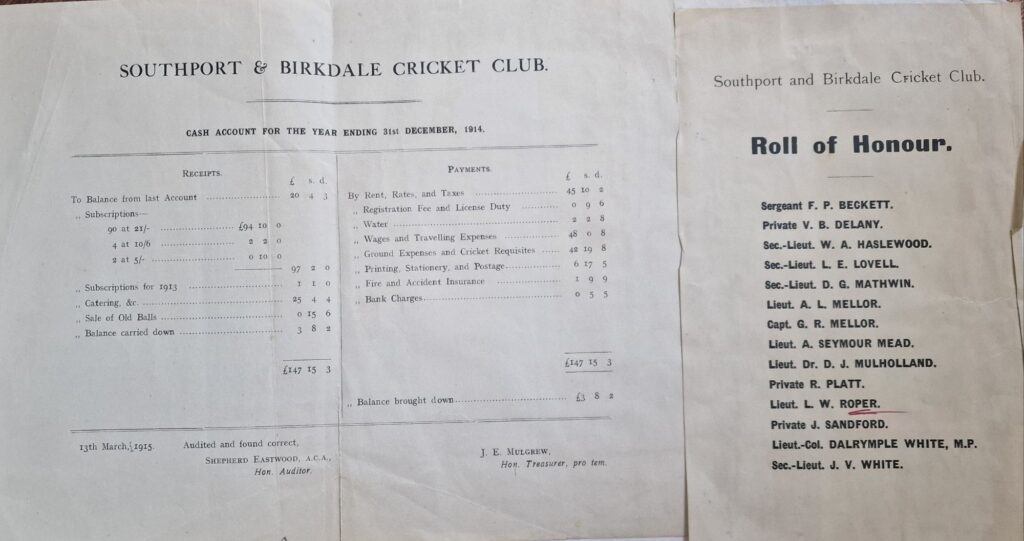
Delany saw intense action on the Western Front. He was seriously wounded on 20th July 1916 at the Battle of Delville Wood (part of what has been collectively known as the Battle of the Somme), having been shot through the chest and back. He was one of nearly 200 men injured in a single day.
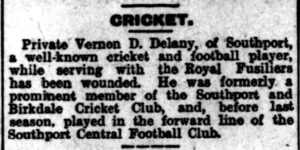
02 August 1916
Image © THE BRITISH LIBRARY BOARD. ALL RIGHTS RESERVED.
He was evacuated to Birmingham for treatment, and eventually returned to the front, joining his unit near Arras and later at Ypres. Promoted to Second Lieutenant in June 1917, he was later transferred to the 12th Entrenching Battalion, working on defences along the Crozat Canal during the German Spring Offensive of 1918.
On 13th April 1918, the Liverpool Echo reported that Delany had been taken prisoner, alongside fellow Southport soldier Captain A.D. Fletcher.
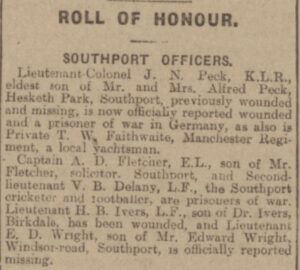
13 April 1918
Image © Reach PLC. Image created courtesy of THE BRITISH LIBRARY BOARD.
The exact details of his captivity and release are unknown, but he was discharged from the army in 1919 due to ill health. This was likely the result of his wartime injuries and time as a prisoner of war.
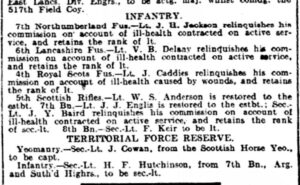
03 September 1919
Image © National World Publishing Ltd. Image created courtesy of THE BRITISH LIBRARY BOARD.
When Cricket resumed at Trafalgar road after the war, Delany was a noted absentee. He had chosen to return to Manchester where he captained Whalley Range for several years and was selected for Lancashire’s Second XI, even taking on the captaincy in minor championship matches. In 1926, he married Lillie Thomas of Manchester.

From that point, however, the trail fades. Vernon Delany passed away in 1976 at the age of 83, but little is known about his later life. If anyone has family memories, photographs, or information about Delany’s post-cricket years, we’d love to hear from you. His early life was one of extraordinary energy and contribution. His later years, for now, remain a quieter chapter in the story.
Discover more from Southport Central
Subscribe to get the latest posts sent to your email.

 1 - 3 v FC Halifax Town (H) 11/10/2025
1 - 3 v FC Halifax Town (H) 11/10/2025 




Profiles
Vernon Bridge Delany Profile
Vernon Bridge Delany Profile
More Stories
Charlie Weir – From Third Lanark to Southport Central
The Price Of Saying No
James Brown Meunier – Southport Central’s French Connection